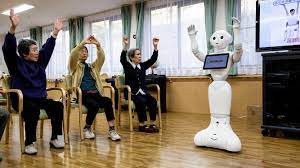Week 3: Art + robots
Industrialization has been an immense focal point for humanity and obviously we have much to thank for it. The modern world, and life as we know it, has been deeply influenced by this era and has given us many advancements. For this week's module of Robots and art, I couldn't help but to focus on the purpose that robots have been given. First and foremost I do think “its important to recognize the creativity and art that goes into bringing a robot or the idea of one to life. Freerk Wieringa is an artist who I believe does a great job of combining these two subjects. Wieringa combines an interaction of steel heavy metal looking sculptures and mechanical motors to create a robotic like experience to life. Personally I believe that in itself is the intersection of art. For humanity to utilize mechanics, science, and computers to create robotics, is indeed a form of art.
During the lecture we learn about Karel Capek, a writer who coined the term robot. I think a key take away from Capek is the origins of the word robot. Professor Vesna explains the term comes from the slavic word, robota which means worker. I think this definition is an important highlight as it explains how we see robots today and what we as humans hope to use them for. Take Japan for instance, a country known for its mainstream use of robotics and machinery. Many places in Japan have replaced humans in the work force and have used robots for what Capek intended them to do, to work. Author Dillon Jaghory explains “Japan's Service robots brighten up restaurants, hotels, stores, and households. Robots that greet customers during non-peak hours can ease the burden for business” .

Another way in which robots have helped and continued to take part in the workforce is explained by a Stanford called “The Impact of Robots on Nursing Home Care in Japan”. Researchers Karen Eggleston, Yong Suk Lee, and Toshiaki Iizuka state “Japan has been a leader in robot production and utilization for many years, and is now looking to use robots to cope with its changing demographics. Rapid population aging and the shortage of caregivers have spurred the government to promote the use of robots in nursing homes. As part of its robot strategy, the government began to provide robot subsidies to nursing homes in 2015. Already by 2016, about 15% of the country’s nursing homes had adopted robots”. All of this provides perfect examples of how robotics has helped humanity, but I can help but to wonder about the negatives of having robots more and more integrated with humans. Chloe Taylor, a writer for CBS does a great job at exploring the negatives and points out what's at stake for humanity in the future, especially those in the workforce. Taylor states “Robots could take over 20 million manufacturing jobs around the world by 2030, economists claimed Wednesday.” Taylor goes on to inform the reader, stating that this could have a serious effect on the loss of jobs for people who belong to a lower socioeconomic status and low skilled workers.
Work cited
Abby. “Karel Čapek – Complete Biography, History, and Inventions.” History, 6 Dec. 2022, https://history-computer.com/karel-capek-complete-biography/.
“The Impact of Robots on Nursing Home Care in Japan.” APARC Home, https://aparc.fsi.stanford.edu/research/impact-robots-nursing-home-care-japan.
Jaghory, Dillon. “Japan's Robot Dominance.” Global X ETFs, 15 Aug. 2022, https://www.globalxetfs.com/japans-robot-dominance/.
“News.” Freerk Wieringa, http://www.freerkwieringa.nl/.
Taylor, Chloe. “Robots Could Take over 20 Million Jobs by 2030, Study Claims.” CNBC, CNBC, 26 June 2019, https://www.cnbc.com/2019/06/26/robots-could-take-over-20-million-jobs-by-2030-study-claims.html.
Images
Cloud, Siesta. “Karel Čapek (1890 – 1938).” Prague Stay, https://prague-stay.com/lifestyle/review/72-famous-czechs/73-czechs-throughout-history/520-karel-capek-1890-1938.
Planetart. “GOGBOT 2012 Freerk Wieringa.” Flickr, Yahoo!, 1 May 2023, https://www.flickr.com/photos/planetart/8460960530.
“Robots & Their Contribution to Aged Care.” Magenta Health Japan Market Research, https://magentahealthjapan.com/robots-their-contribution-to-aged-care/.




Comments
Post a Comment